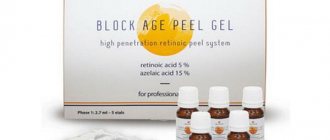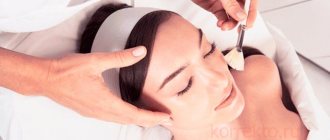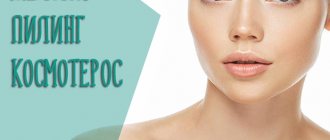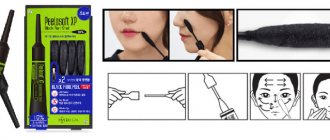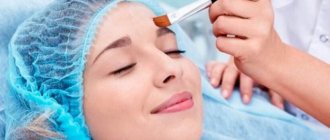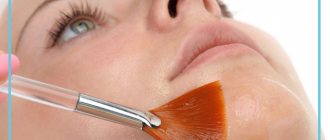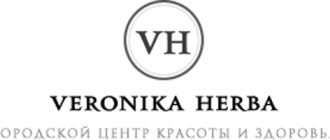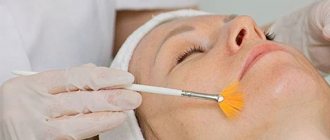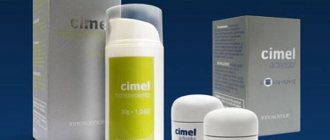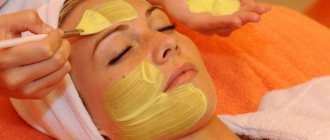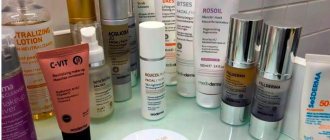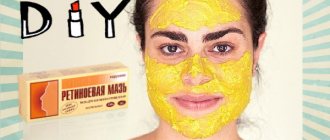Among chemical peels used in therapeutic cosmetology, retinoic peels rightfully occupy a special place due to their fundamentally different mechanism of action.
Increased synthesis of collagen, elastin, hyaluronic acid and other glycosaminoglycans is clinically expressed in the lifting effect, smoothing wrinkles, improving skin turgor and tone.
Finally, it is possible not only to easily overcome the stratum corneum of the epidermis, but also to introduce retinoids into the connective tissue of scars (including stretch marks and post-acne), as well as restore normal collagenosis in pathologically altered tissues. The new drug is also highly effective when used on areas of the body with reduced tone and turgor - the inner surface of the shoulders and thighs, and a flaccid abdominal wall.
Advantages
Yellow peeling
try
- efficiency;
- no complications;
- high security;
- good controllability;
- ease of use;
- stimulating effect on the skin;
- for the correction of a wide range of aesthetic problems of the face and body;
- lasting good result as a rejuvenating procedure for severe photoaging.
About the manufacturer
Martinex is the largest holding in the beauty industry. It has been successfully developing since 1992.
The company began its activities with an ordinary cosmetology salon in Yekaterinburg. Today it successfully competes with the most famous organizations in the field of cosmetology and aesthetics.
In 2015 and 2016, Martinex received the prestigious ENEX medal for his contributions to the development of innovative technologies, and in 2016, the Oxford Prize.
Company advantages:
- subjects all products to appropriate quality checks;
- develops and applies innovative technologies in the production of medicinal products;
- is the creator of a unique bioremediation drug for dermal rejuvenation;
- takes an active part in scientific research in the field of oncology;
- owns one of the advanced techniques - highly effective mesotherapy.
Indications and contraindications for retinoic peeling
Retinoic facial peeling has a rejuvenating effect, so it is used between the ages of 35 and 50 years. At the same time, if necessary (for example, if a patient has post-acne), it can be performed earlier, starting at age 20.
| Indications | Contraindications |
|
|
Description of means
Martinex peelings are represented by an extensive line. The composition is selected individually for each patient.
The choice depends on the condition of the skin, client preferences, the presence/absence of contraindications, the speed and healing of the injured surface.
These funds are indicated in the following cases:
- signs of early aging;
- aesthetic defects;
- small wrinkles;
- severe pigmentation and acne;
- scars and consequences of acne;
- saggy oval face;
- enlarged pores;
- smoker's skin, etc.
- Medium peeling is effective against stretch marks and small scars.
Yellow
Light superficial retinoic (or yellow) peeling Block-age peel Cream is designed for women over 25 years of age. Suitable for use on thin skin.
Indications for use: treatment of scars after surgery and acne, severe hyperpigmentation, wrinkles.
Efficiency - the skin becomes smooth and bright, the appearance is transformed, the aging process slows down. The recovery period lasts only 1-2 days.
Buyanov Sergey Yurievich (Expert Doctor):
After yellow peeling, precautions must be taken to avoid skin contact with direct exposure to ultraviolet radiation. That is, use sunscreen and avoid visiting the solarium for two weeks. If you violate the rules, you may develop a sunburn.
Almond
MANDELICPEEL 40% is created from almond extract. Has a bactericidal effect. Recognized as one of the best drugs in the fight against acne and early signs of aging. It perfectly nourishes and fills cells with moisture, prevents infection, evens out color and promotes collagen production.
Suitable for solving the following problems:
- post-acne;
- acne 1 or 2 degrees;
- abundant pigmentation;
- photoaging;
- red spots;
- withering of the dermis;
- seborrhea.
The drug can be used throughout the year, regardless of the season. Suitable for any skin type. Usually 8-9 sessions are recommended with an interval of 10 days.
Apply the product with a brush. An indicator to stop the procedure is the appearance of redness.
After use, slight peeling may be observed. It will go away quickly if you apply a cream with collagen or algae extract to the skin.
Lactic
LACTICPEEL contains 50% lactic acid. It is able to penetrate deeply, carefully interacting with the epithelium. Lactate promotes collagen production and accelerates the formation of glycosaminoglycans.
The main component does not cause allergies.
Milk peeling perfectly whitens and moisturizes the skin and is indicated for people with heavy pigmentation and post-acne. Suitable for sensitive and dark skin.
For a good result, 4-8 procedures are recommended. Apply the product with a brush or cotton swabs.
Glycolic
This superficial peeling is one of the most popular. Can be used from 15 years of age! The composition is based on glycolic acid. It quickly penetrates the skin, saturating it with moisture. The pH value is at least 2.0, so a neutralizer must be used.
A cleansing procedure using a glycolic product is effective in solving the following problems: acne and pigmentation, ingrown hairs, age-related changes, aesthetic defects.
A cosmetologist can add other acids (lactic, salicylic, phytic) to glycolic peeling. Apply the product with a brush.
Salicylic
Salicylicpeel 15% and 25% is a powerful antiseptic that triggers the process of skin regeneration. Contains salicylic acid extracted from willow bark. It has a shallow effect without significantly affecting the layers of the epidermis.
The product is suitable for combating early signs of aging, hyperpigmentation, eliminating flaking, and reducing the work of the sebaceous glands.
Buyanov Sergey Yurievich (Expert Doctor):
Salicylic acid is most often used in cosmetology because it does not penetrate deeper than the upper layers of the epidermis, is not absorbed deeper at all, and does not cause burns either during the procedure or after it.
Jessner
This drug is classified as superficial, but if you apply the product in several layers, you can compare it with the middle one.
Experts advise that during the first procedure, limit yourself to one layer, and then gradually increase their number. There can be from 1 to 8. The result will directly depend on the thickness of the application.
The main components of the drug: lactic and salicylic acids, resorcinol. The advantages of the composition are safety, low likelihood of complications and wide area of application.
Indications for use:
- signs of wilting;
- abundant pigmentation;
- wrinkles;
- hyperkeratosis;
- uneven terrain;
- seborrhea.
After the course, epidermal cells are restored and renewed, blood circulation is normalized, pigmentation disappears, the skin becomes smooth and elastic.
Sessions are held every 3 weeks. It is recommended to carry out 6 procedures. It is better to apply the drug with a cotton pad or swab.
Trichloroacetic
TCApeel 15% and TCApeel 25% with trichloroacetic acid are intended for medium peeling. They have a burning effect. The composition includes amino acids, so they are also used to eliminate inflammation and increase immunity.
Use is strictly contraindicated for dermatosis, inflammation of the skin, allergies, pregnancy, wounds, abrasions, etc.
Peeling is ideal for rejuvenation: it regenerates and protects the skin, dilates blood vessels, and destroys bacteria.
A full course of procedures helps get rid of stretch marks and scars, correct aesthetic problems, and eliminate signs of premature aging.
Cleansing sessions with TCApeel 15% are carried out according to the scheme - 5 through 10. Cleansing with TCApeel 15% is done once every six months.
What are the differences between peelings?
The main difference is the possibility of using almond exfoliant in patients with intolerance to glycolic acid. Almond can also be used for rosacea, for face and body care. All-season use allows you to maintain a well-groomed blooming appearance throughout the year.
Glycolic has a more pronounced property of moisturizing, restoring elasticity, and reducing the number of superficial wrinkles due to its low molecular weight. Superficial peels have general contraindications, stages of implementation, as well as post-peel care. To achieve the desired aesthetic result, you must undergo a course of procedures. What is better to choose is decided only by a cosmetologist during an individual consultation.
Both almond and glycolic cleanses may cause side effects. They are temporary and, if you follow the rules of the post-peeling period, go away on their own. To prevent unwanted effects, you should choose an experienced, qualified cosmetologist.
Complications:
- redness, swelling;
- peeling, dryness, feeling of tightness;
- irritation, increased sensitivity.
Contraindications:
- pregnancy, lactation;
- herpes in the active stage;
- damage to the integrity of the integument, wounds, burns;
- viral infections;
- the presence of foci of inflammation;
- oncology;
- carrying out a course of treatment with hormonal or antibacterial drugs.
The exfoliation effect of different types of acids is also common. As a result, the skin looks refreshed, renewed, it is possible to cope with superficial wrinkles and remove unexpressed pigmentation. Regeneration processes are normalized and aging is effectively prevented.
Unlike almond and glycolic, salicylic peeling can be superficial or medium. It is used primarily in a program for restoring dense, porous skin, with enlarged pores, sebaceous plugs, and frequent inflammatory elements. In addition to cleansing, it helps regulate sebium production and neutralize the effect of pathogenic microflora.
Just like superficial peels, it requires a course of treatment to achieve the desired effect. This is only part of the program for restoring oily problem skin; consultation with specialized specialists, the use of professional line care products at home, as well as lifestyle and nutrition correction to normalize intracellular processes are required.
Milk peeling is intended exclusively for the care of thin, dry dermis. It has a gentle effect, removes toxins and dead cells, and restores hydrobalance. Unlike other types of exfoliation, the compositions work on the principle of gommage. In some cases, patients note the absence of pellets during the procedure, which is due to the delicate effect of milk peeling on the skin.
How does peeling work?
The procedure is preceded by a mandatory preparatory stage, followed by a set of caring measures. Preparatory measures must begin 2-3 weeks in advance. If sessions are planned during the summer season, it is recommended to apply sunscreen.
The main goal of preparation is to reduce the thickness of the stratum corneum. This will allow retinoids and other beneficial components to penetrate deeper into the subcutaneous layers. Special creams from Martinex will help with this:
- cleansing foam based on natural nutrients;
- Prepeel Ligh cream with disinfecting and anti-inflammatory components.
Protocol:
- Cleansing your face from dirt and makeup residues with Cleanser Mousse. The mousse is applied to the skin and left for 20 minutes, then washed off with water.
- Disinfection with Prepeel Lotio lotion.
- Using a cotton swab or brush, the peeling is evenly distributed on the surface of the dermis and left for some time to dry. Application technique: from forehead to chin. Normally, the patient may feel a slight tingling sensation. Then the next layer is applied. Their number is selected individually, taking into account the skin type and the problems being solved. Drying time for the last layer is 3 minutes. Next, the entire composition is washed off with water. A neutralizer is not used in the procedure.
- Applying a moisturizer (cream or mask).
If a strong burning sensation occurs, use a neutralizer immediately.
Martinex peels * Yellow, almond, retinoic, glycolic
The main assistants - Martinex peelings should be in service with every girl, especially in the modern world, when pollution and harmful substances are in the air. Peeling is one of the popular cleansing procedures in the salon industry that does not require any injections.
Popularity is associated with fast as well as effective results. The main function of treatment is exfoliation of the stratum corneum of the skin. Cosmetologists recommend it for use by girls with defects such as wrinkles, pimples, vasodilation, scars, pigmentation, and sagging skin.
The cosmetic process has several stages:
- Preparation;
- peeling;
- rehabilitation.
The effectiveness of Martinex peels
There are many advantages:
- smoothing of the skin;
- reduction, cleansing of pores;
- lifting;
- collagen stimulation
- evens out color;
- stimulates recovery.
Superficial peeling eliminates oiliness, acne, and improves skin condition. Median is effective not only for eliminating signs of age in the form of wrinkles, but also stretch marks and scars.
Who is suitable for peelings from Martinex?
Peeling is a universal cosmetic procedure that is suitable for any skin type. Dark-skinned girls should not be afraid of chemical exposure. It’s worth buying martinex products and getting rid of not only pigmentation, but also wrinkles, scars and acne, because these are a girl’s main enemies.
Using the martinex product will make your skin not only healthy, but also well-groomed, like the models from commercials.
Before doing this procedure, any experienced doctor or cosmetologist will insist that the client make masks with a small concentration of acid for 8-10 days.
Summary
Why do cosmetologists choose Martinex products? Martinex cosmetic products are a miracle in the beauty industry. They have a gentle and gentle composition.
The main task of martinex products is not only to rid the skin of peeling, but also to remove the upper layer of the epidermis, eliminating almost all skin problems without causing allergies or serious consequences.
Incredible! Find out who is the most beautiful woman on the planet in 2020!
Aftercare
After superficial or deep cleansing, the skin becomes soft. The duration of the effect will directly depend on the following factors:
- patient's lifestyle;
- skin care.
During the first 5 days, dryness and flaking are possible. These are normal phenomena. During this period, you can use plasticizing drugs aimed at rapid recovery. For example: Vegefarma and Thriphalan Balm. It is better to consult a cosmetologist in advance.
General recommendations:
- When going outside, apply sunscreen to your face;
- use moisturizers with low concentrations of glycolic acid;
- refrain from sunbathing, including solariums;
- the first 2-3 for not visiting the bathhouse or sauna
Important! Smoking reduces efficiency and damages the skin. If you want to preserve your youth, you must also give up cigarettes.
Rehabilitation period
Recovery lasts 4–10 days. The duration depends on the susceptibility of the integument and the intensity of the intervention performed. Skin care differs little from the standard everyday option. Regular cleaning is carried out using mild detergents. If necessary, Vegefarma cream is applied to the surface (can be replaced with Thriphalan Balm ointment, regular panthenol). When going outside, be sure to use a product with a high SPF level: the manufacturer recommends Mediscreen.
In the first 2–5 days, the development of edema, erythema, and swelling is possible. The integument turns yellowish. The external picture is similar to that which occurs after excessive insolation. You may experience unpleasant sensations in the form of burning, tingling, itching in mild forms.
Active peeling occurs on days 2–3. The nature of exfoliation is individual: pieces of skin can come off in small strips or peel off in whole layers. The doctor will warn against helping exfoliation: scratching the face or tearing off exfoliating pieces is prohibited
This is important to obtain a quality result
The appearance of itching or a mild rash in different parts of the body does not necessarily indicate an allergy. In doubtful situations, you can additionally consult a cosmetologist.
During preparation and rehabilitation, it is prohibited to sunbathe or be in the sun without protective cream. The restriction is valid for up to a month. The cosmetologist will also indicate the need to refuse:
- using scrubs and other care products with abrasive particles, performing various intensive procedures;
- applying substances containing alcohol and fruit acids to the surface;
- coloring of eyebrows, eyelashes, and other effects using aggressive chemicals.
It is also recommended to avoid visiting the sauna, swimming pool, washing in hot water, drinking alcohol, playing sports, and using decorative cosmetics. Peeling finally stops after 8–10 days. At this time, most restrictions are lifted. Repeated intervention is carried out 1–2 months after the previous procedure.
Is it acceptable to use at home?
Some women do chemical peels themselves in an attempt to save money. This is quite convenient, but not safe and often ineffective.
Products containing acid can cause a number of negative consequences, so before doing so, you should visit a cosmetologist who will give professional recommendations.
The best option is to trust an experienced cosmetologist and carry out the manipulations in the salon. This will help avoid complications and give better results.
Recommendations from cosmetologists on choosing peeling
Before deciding on the type of procedure, you need to pay attention to a number of points:
- initial state of the epidermis;
- client age;
- presence of dermatological problems;
- taking into account contraindications;
- duration of the rehabilitation period.
The client should have at least a general understanding of all types of chemical exposure before going to a beauty salon.
For example, which peel is better, yellow or TCA. In the first case, the active ingredient is retinol. It promotes renewal of the dermis at the cellular level, stimulates the formation of collagen, and whitens age spots. However, the yellow peeling procedure is accompanied by a strong exfoliating effect, and there is a possible risk of inflammation.
An alternative to retinoic peeling is trichloroacetic acid cleansing. Clients note that the session is accompanied by painful sensations. The composition noticeably smoothes the skin, removes blackheads, and rejuvenates. Use causes severe peeling and hyperemia.
You can compare other types of acid peels (for example: salicylic or glycolic). In the first option, the main component is salicylic acid. The substance has an antiseptic effect, cleanses pores, removes keratinized particles, and evens out the relief. Glycolic acid exhibits the same properties, but also enhances collagen synthesis and removes the effects of acne. However, due to the small size of the molecules, it quickly penetrates the skin and can cause irritation and burning.
Which peeling, almond or salicylic, is better for sensitive skin? The first option is good in this pair. It gently cleanses the dermis without causing irritation and copes with severe acne and severe pigmentation.
Which peeling is better to choose yellow, glycolic, salicylic, TCA or still use the usual scrubs, cosmetologists give a clear answer. Cleansing with chemical exfoliation guarantees results.
- The process of formation of new cells starts.
- The deeper layers of the epidermis are nourished and moisturized.
- Small wrinkles disappear and deep wrinkles become less noticeable.
- The consequences of acne are eliminated.
- Pigmentation is removed.
Precautionary measures
Before applying the product you must:
- conduct an allergy test;
- read the instructions carefully;
- check the expiration date of the product.
Attention! The procedure should be carried out in a course no more than once every 10-14 days.
Contraindications:
- allergic reaction to the components of the products;
- inflammation of the epidermis or skin pathologies;
- wounds, scratches and abrasions on the treated area;
- herpetic rash, fungus;
- recent surgery;
- pregnancy and breastfeeding.
Peeling should not be carried out on newly tanned skin. The procedure will have to be postponed during menstruation and taking hormonal medications.
Skin as an organ
Contrary to popular belief, the skin is an independent organ that performs specific functions. This is a complex complex of tissues that protects internal organs from harmful external influences. The dense outer shell is a natural barrier to toxic chemicals and pathogens. Special cells containing melanin prevent tissue from being overexposed to sunlight. At the same time, ultraviolet radiation is used by the skin to produce vitamin D. Other functions of this organ include external respiration, thermoregulation, protection from mechanical stress and blood deposition.
Departments of the organ:
- The epidermis is the outermost part of the skin, consisting of five layers. The upper layer of the epidermis is formed by dead (keratinized) cells with tight intercellular junctions. The stratum corneum is the main protective structure. The lower layers of the epidermis contain regenerative centers that promote periodic tissue renewal.
- The dermis is the middle area of the skin, consisting of muscle fibers, nerves, blood vessels, fiber, sweat and sebaceous glands. In addition to blood supply and innervation, this part of the organ is involved in metabolism: sweat glands control the water-salt balance in the body. Hair follicles are also present in the dermis.
- Subcutaneous tissue is the deepest part of the organ, formed by adipose tissue and other histological structures. An important task of fiber is to maintain body temperature and prevent mechanical effects on internal organs.
The beauty of the skin largely depends on regular tissue renewal and timely cleansing of the stratum corneum. Normally, dead epidermal cells are regularly sloughed off. Hygiene procedures speed up this process. At the same time, irregular skin cleansing is possible with the formation of a hard crust and ingrown hairs. In this case, gentle peeling is the best way to improve the appearance of the skin.
Opinion of cosmetologists
Cosmetologists speak positively about Martinex peelings. They say the main advantage is ease of use and the absence of side effects. Experts talk about the need to prepare the skin before the procedure - this is how you can achieve excellent results and long-lasting effects.
However, recently you can find negative reviews about products on forums. Some cosmetologists complain about the poor quality of products in the latest supplies.
HOW BOTH METHODS WORK
TCA and yellow peeling are chemical types of exfoliation that destroy intercellular connections in the upper layers of the skin using acids.
These exfoliants cause a controlled chemical burn. Then our body’s defense systems receive information about the damage received and launch emergency recovery processes. As a result, the production of new cells, collagen and elastin fibers begins.
Features of TCA peeling
A distinctive feature of the external manifestation of TCA is a white coating (frosting effect), which appears after applying the exfoliant. Frost consists of coagulated epidermal cells, which are wiped off the face by a cosmetologist at the end of the procedure.
In medicine, trichloroacetic acid is used as a cauterizing agent. But its property is also known to inhibit the activity of keratinocytes, reducing the risk of age spots.
Read more: TCA PEELING: why does it have so few fans?
The procedure should only be trusted by an experienced specialist: you need to carefully monitor changes in the skin and remove the exfoliant in a timely manner. The product itself is toxic and can cause too much damage to skin cells (including keratinocytes), leading to a significant decrease in their protective functions.
Features of yellow peeling
Yellow exfoliation also has its own unique signature: the exfoliating composition, which is kept on the face for 6-14 hours, has a clear yellow tint. So you will have to endure a cheerful complexion for some time.
Read more: YELLOW (retinoic) PEELING: update for 1 weekend
Unlike other exfoliants, retinoic acid does more than simply exfoliate and tighten the top layers of skin. Retinoids directly change cellular processes and are an excellent anti-aging and anti-cancer agent.
Benefits of Ultraceuticals Products
Ultraceuticals milk peeling contains only completely safe ingredients.
The base is natural lactic acid. Normally, it is found in healthy skin and increases the production of ceramides, substances that form the barrier layer. The drug is completely biocompatible, has a mild effect, so the procedure is comfortable for the patient and well tolerated. Ultraceuticals peeling compositions have undergone multi-stage clinical trials and have proven their effectiveness in practice. They are used by cosmetologists all over the world.
